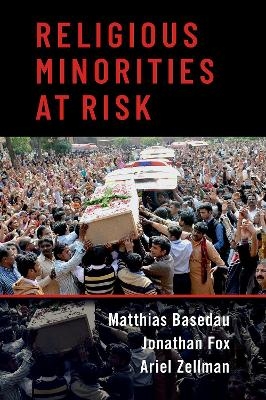
Religious Minorities at Risk
Oxford University Press Inc (Verlag)
978-0-19-769394-0 (ISBN)
It also shows the different effects of governmental and societal religious discrimination versus political and economic and marginalization. Religious, political, and economic grievances each escalate conflict intensity by aggrieved minorities in different ways. Ultimately, the book shows that collective grievances remain a powerful explanation for minorities' conflict behaviors; although influenced by DDI, they are not reducible to them. Second, while religious factors, including religious discrimination and grievances, uniquely contribute to minority conflict behavior, the overall patterns observed for religious minorities closely mirror those typically theorized for other minority groups. Finally, minority conflict intensity reflects the difficulties states encounter in accommodating them. Whereas religious grievances are relatively easily accommodated and therefore rarely escalate beyond rioting, political grievances influence a wider range, from non-violent protest to violence against civilians. Economic grievances, which demand costly systemic reforms, more often escalate to rebellion. An essential work on the causes of intercommunal and intrastate conflict, this will assist policymakers dealing with these issues.
Matthias Basedau, PhD is Director at the GIGA Institute of African Affairs and adjunct Professor at Hamburg University. His research focusses on comparative politics and the causes of violent conflict, in particular regarding the role of ethnicity, political institutions, natural resources, and religion. His main geographical area of interest is sub-Saharan Africa, especially Sahelian countries. Within the framework of the Bertelsmann Transformation Index, he is coordinator for West- and Central Africa. He has published widely on the above mentioned topics, inter alia in the American Journal of Political Science, Journal of Conflict Resolution, Journal of Peace Research, and Political Geography. Jonathan Fox, PhD is the Yehuda Avner Professor of Religion and Politics, director of the Religion and State (RAS) project. He has received awards from both the International Studies Association (ISA) the American Political Science Association (APSA) for his research in religion and politics. He is author or editor of fifteen books and over 100 peer-review articles on various topics in religion and politics. Ariel Zellman, PhD is an Assistant Professor in the Department of Political Studies at Bar-Ilan University in Ramat Gan, Israel. His primary research areas include examining how competing national identity narratives contribute to the protraction of international territorial conflicts, the influence of state-religion politics and religious claims on interstate and intrastate conflict, and the impact of white nationalist movements on American Congressional politics. His work has been published in multiple academic journals including American Politics Research, East European Politics, Journal of Conflict Resolution, Journal of Peace Research, Politics and Religion, Religions, Security Studies, and Territory, Politics, Governance.
Foreword
Acknowledgments
Chapter 1: Introduction
Chapter 2: What are Discrimination, Deprivation, Inequality, and Grievances?
Chapter 3: From Discrimination, Deprivation, Inequality to Grievances
Chapter 4: Religious Minorities, Mobilization, Protest, Conflict, and Violence in Theory
Chapter 5: An Empirical Examination of the Grievances to Mobilization Model
Chapter 6: Conclusions
Appendix
References
Index
| Erscheinungsdatum | 22.07.2023 |
|---|---|
| Verlagsort | New York |
| Sprache | englisch |
| Maße | 237 x 162 mm |
| Gewicht | 599 g |
| Themenwelt | Geisteswissenschaften ► Religion / Theologie |
| Sozialwissenschaften ► Politik / Verwaltung ► Europäische / Internationale Politik | |
| Sozialwissenschaften ► Soziologie | |
| ISBN-10 | 0-19-769394-6 / 0197693946 |
| ISBN-13 | 978-0-19-769394-0 / 9780197693940 |
| Zustand | Neuware |
| Haben Sie eine Frage zum Produkt? |
aus dem Bereich


